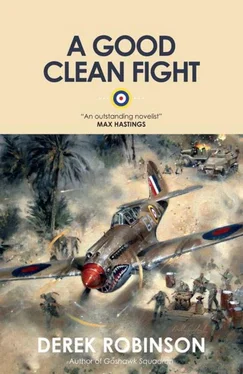“That’s never happened before,” Lampard said. “Normally, when a shufti-kite flies away, you can still hear it for a minute or two. Especially if it’s climbing.”
“Beats me,” Dunn said.
Lampard stood up and rubbed his backside. “If we didn’t hear it fly away,” he said, “that means it hasn’t flown away.”
“Logical,” Dunn said.
“If it hasn’t flown away, it’s on the ground. Nearby.”
“Fancy that,” Dunn said.
“I do fancy it. Go due west one mile,” Lampard told his driver. “That’s where he faded out.”
* * *
The pilot switched off the engine before the Storch had rolled to a halt. Already the desert heat was hammering at the cockpit and Schramm was sweating hard. Part of this was panic. “That was a very stupid thing to do,” he said. “What if we can’t get it to start again?”
“If I have to crawl over this wreck,” said the pilot, “I would prefer not to do it behind a prop that is throwing desert at me like a small sandstorm.” He opened the door and stepped down. “Don’t touch anything,” he called. “It might be booby-trapped.”
Schramm slid his side window back and felt the desert breathe its heat at him. He hated it for wanting to bake him to death and hated it even more for being such a faceless murderer. There was nothing out there to focus his hatred on. Everything to see and nothing to look at. Just a trembling blur of sand. After a while Schramm realized that his head was doing the trembling and he closed his eyes. Slashes of purple and scarlet flickered and merged, vanished and popped back. His imagination repositioned him high in the sky, looking down on himself, a speck inside a bigger speck lost in a flat wilderness that didn’t give a damn for either of them.
When the pilot climbed in and shook him awake he was sunk in such a deep fatigue that the man’s words meant little. “Trouble with the elevator. Maybe a pulley’s jammed somewhere and trapped a cable, I don’t know. All I know is the elevator won’t elevate us. Also the engine hasn’t been giving full power. I found a cracked fuel line, which means dust and dirt got in, so now we’ve got dirty fuel. I told you this wreck was a wreck.”
“Yes,” said Schramm, and felt pleased with his achievement.
“If they’ve got any brains in Barce they’ll come looking for us.”
“I’m the brains in Barce,” Schramm said.
The pilot sighed. “I think I’ll have a little sleep,” he said; but instead he put his head out of the cockpit. “Hear that?” he asked. Schramm held his breath and listened. Beyond the thump of his own pulse he heard the low mumble of engines.
“Nothing in sight on this side,” the pilot said. All the cockiness had left his voice. Schramm squinted at the haze, much thinner now, saw nothing and said nothing. The pilot heaved himself across the cockpit and got his head out of the other window.
Five seconds later he dropped back into his seat. “The trucks we were chasing seem to have found us,” he said. Already he was priming the engine, setting the throttle, thumbing the starter.
The Storch was still hot: she fired instantly, dirty fuel or not. Within thirty yards she was flying. The pilot got her ten feet off the ground and failed to make her climb an inch higher. “Any idea how fast they can go?” he asked. Schramm took too long thinking. “Never mind,” the pilot said. “We’ll soon know.”
* * *
Lampard led the patrol at a brisk, bumpy twenty miles an hour through a shallow depression and around a patch of rocks, and stopped. Before he could raise his binoculars he saw the Storch, half a mile to his right, just as it left the ground. “Tally-ho!” he shouted. “After the bastard!” But his driver had already seen it and Lampard’s words were lost in the bellow of the engine. The jeep jumped away from its own dust.
The rest of the patrol joined in the chase with more or less enthusiasm. Mike Dunn, in the armed truck, urged his driver on. He knew the contest was absurd: any plane could outrun a truck, never mind out-climb it, but where Lampard led, Dunn followed: simple as that. Sergeant Davis, in the other armed jeep, did the same. In the wireless truck Tony Waterman left it to his driver to decide the pace. Waterman’s job was to remain operational, send and receive signals, not get mixed up in combat. Captain Gibbon, the navigator, had taken over the Alfa-Romeo, and he made no great effort to keep up. The desert surface was patchy and in parts treacherous, the Alfa’s tires were losing their tread, and Gibbon believed that Lampard was simply frightening the German plane away, so why take chances?
After a quarter of a mile Gibbon saw that he was wrong. The Storch was flying, but only just. It was not climbing and it was not escaping. As the Alfa bucketed over some unexpected corrugations, Gibbon saw the red pulse of tracer leap from the machine guns in Lampard’s jeep and arc high toward the plane. The burst fell short. But not all that short.
Schramm heard the stammer of the guns. He felt curiously unworried. Flying like this was like traveling on a gentle fairground ride, dipping and rising and dipping again. It took his mind off the pain. “Can you see them?” he shouted.
“Ever been to Jalo?”
“No.”
The pilot saw the glint of an outcrop coming toward them and he nursed the machine over it. “Oasis, right? Palm trees, yes? Hundreds. Thousands, probably.”
“Are you going to Jalo?” Schramm asked. It was you , not we . Schramm was just a passenger now. Excess baggage.
“She won’t go over any palms,” the pilot said. “They’re much too high for her.”
Schramm looked out and saw the odd palm tree, its fist of leaves well above their heads. The corner of his eye caught the flicker of tracer, as hot as neon. “I know you can’t climb,” he said, “but can’t you go faster?” He could see there was plenty of throttle waiting to be used.
“Faster is slower. Watch.” The pilot opened the throttle a fraction. At once the speed increased but the nose went down. He closed the throttle by the same fraction and the nose came up again. “Slower is faster. Know why? Fly slow and there’s not much airflow over the elevators. We stay up. Fly faster, more airflow for the elevators to bite on, so they send us down. It’s a balancing act.”
“They’ll catch us if you don’t go faster.”
“They’ll catch us if we do. Catch us with our nose in the sand.”
Lampard braced himself to fire another burst and as he squeezed the triggers the jeep cornered so sharply that he got swung sideways, lost his footing and shot the sky instead. “God’s bowels!” he shouted. When the jeep straightened, he looked to see what the driver had avoided. The sand was brown in places, so brown it was almost chestnut, but tinged white. “Salt marsh?” he said. The driver nodded, too busy searching the land ahead to speak. Lampard looked for the Storch, no longer dead ahead, then looked for the rest of the patrol, strung out behind, and he made his decision. “Stop!” he said. “This is no damn good.”
The jeep turned and cruised back, skirting the long patch of salt marsh. Dunn’s truck saw them coming and waited.
“Nasty bit of bog,” Lampard said. “By the time we found a way around it, we’d have been too late.”
“Pity,” Dunn said. “You were gaining on him, too.”
“I was indeed. How far away d’you reckon those palms are?”
“Which palms? I can see about five thousand.” The skyline to the north and west was black with trees. Some seemed to float on lakes of light.
“Two miles at most.” Lampard answered his own question. “More to the point, where’s Jalo garrison? It could be on the other side.”
Читать дальше












